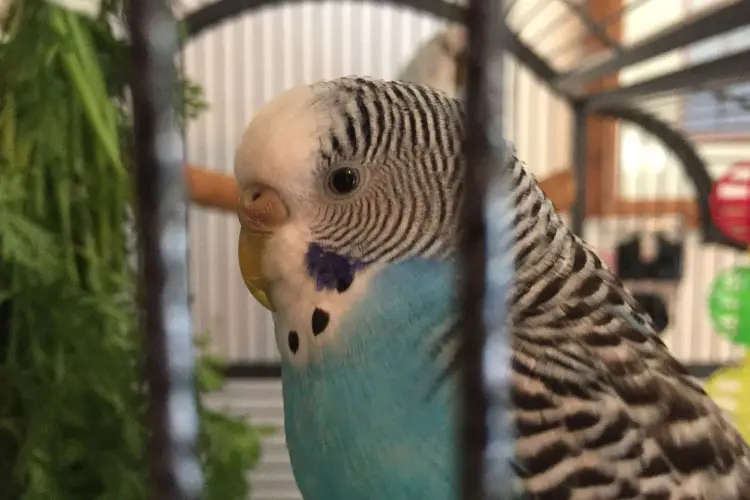Budgies are colorful birds that avian pet lovers enjoy caring for and gazing at. However, due to unwanted injuries or birth defects, some birds are blind, a condition most owners don’t ascertain. How can you tell that your pet bird lacks vision?
So, How to Tell If a Budgie Is Blind? You can tell your budgie is blind if it doesn’t sense objects placed near its eyes. Also, if your bird starts to fly into objects and doesn’t realize when you’re approaching, it might be blind. However, an avian vet should confirm the condition.
As much as bird lovers adore avian pets, having one with a condition like blindness can be challenging. Read on to learn how to care for your pet and what causes blindness.
How to Tell If a Budgie Is Blind?
Like humans, birds have all five basic senses which are touch, sight, hearing, taste, and smell. If one of these senses seizes to work, the birds must adapt, which can be testing to some. Vision is one of the most crucial senses for birds, mainly because of their role in a safe flight.
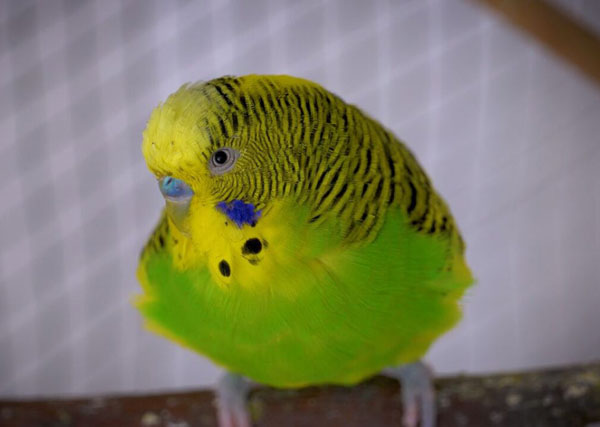
Most times, budgie blindness is undiscerned until another condition surfaces. This is because the birds adapt quickly, and owners must be attentive to notice. Below are some ways you can tell if your budgie pet is blind.
1. Lack of reaction
As prey animals, budgies react defensively when objects near their eyes if your bird doesn’t react when an object near both or either of its eyes, it might be blind.
2. Flying into objects
Though birds are known to fly through glass and mirrors, they are unlikely to crash on solid objects. If your bird starts flying into objects they weren’t a few days ago, it might signify a developing vision problem.
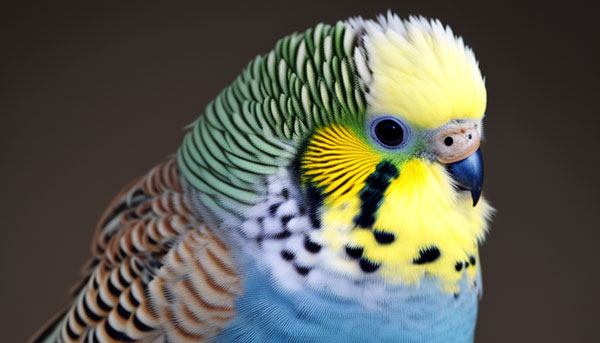
3. Walking off the edge
Birds can realize when they approach surface edges and prevent falling. If your bird regularly bumps into objects and doesn’t realize the edges, it might be blind.
4. Depression
If your bird loses sight instantaneously, it is likely to get depressed and spend most of the time perched. The condition is expected if the bird is living alone.
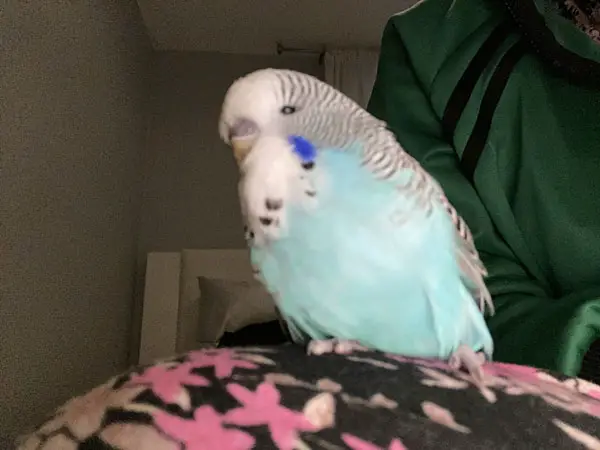
5. Appetite Loss
Due to the reduced movements, a budgie suffering from blindness will feed less and show no interest.
6. Discharge from the eyes
Epiphora discharge, an abnormal tear flow, is common in birds suffering from blindness. Because there might be other reasons for the discharge, take your pet to a vet.
Budgies can be fully blind or partially, meaning they can see objects nearer to them but not further. Also, blindness can be in one eye, especially if an injury is the cause of lost sight. However, a veterinarian should always be the one to confirm these conditions.
What Causes a Budgie to Be Blind?
There are various reasons why your budgie pet might get blind. While some are age-related, some are due to unwanted injuries fatal enough to result in blindness. Below are some causes of blindness to budgies.
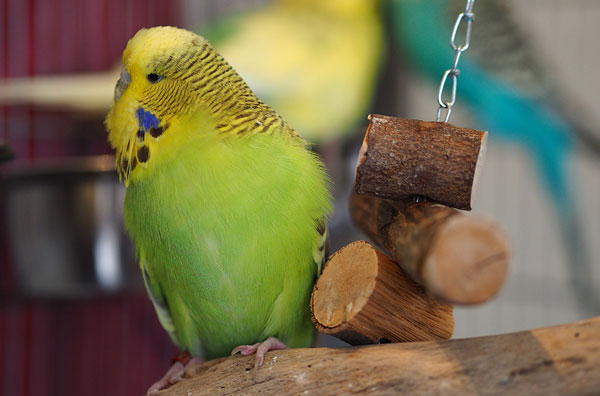
- Birth – Budgies can inherit blindness from genetic malfunctions by their ancestors.
- Retinal detachment – Retinal detachment is mostly age-related, as the fluids in the eyes have problems. It can also be caused by blood leakage behind the bird’s eyes or by traumatic injury.
- Cataracts – While a bird’s eye lenses are clear, if the opacity increases, the bird is said to have cataracts. Cataracts in birds can lead to blindness if left untreated.
- Diet – Deficiencies of vitamins A and E, which assist with eye health, can result in budgie blindness.
- Injuries – Traumatic injuries can cause blindness by either shuttering the eye or causing internal bleeding.
- Bacterial infection – Bacteria such as salmonella enterocolitis can cause vision problems and blindness.
- Fungal infections – Infections like fungal endophthalmitis can cause ocular injury, followed by blindness.
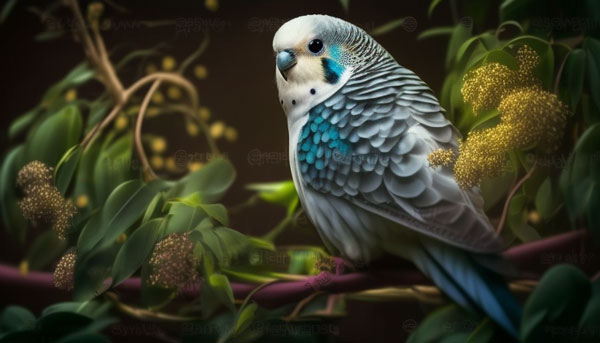
What Do You Do to Assist a Blind Budgie?
Caring for a blind budgie can sometimes be easy since the birds tend to adapt quicker. It is often easier for budgies born blind to adapt faster than those that just lost sight. However, every blind bird needs care, and following the tips below can help you.
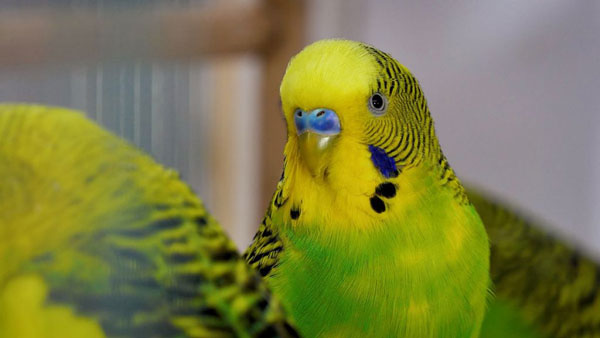
- Don’t rearrange the cage since birds will use these objects to know their position.
- Keep the budgie in the company of other birds which it can follow and map the environment.
- Verbally alert your budgie when approaching, not startle it
- If the bird is fleshly wounded in the eye, take it to a vet who should give an anti-inflammatory drug and treat it.
- Use colored objects if your budgie is partially impaired, and improve lighting.
- Remove all sharp objects and barricade the edges to prevent the budgie from walking off.
- Shaking the food bowl or tapping the water can be a way to teach the pet to locate these objects.
- Use different carpet textures to mark various locations.
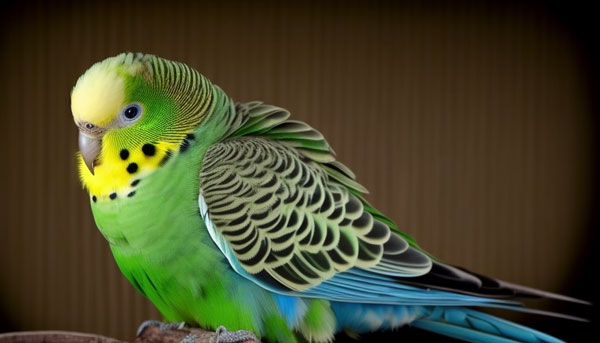
How to Feed a Blind Budgie?
Whether your pet budgie was born blind or the problem developed later in life, you need to know how well to care for it. As a caring budgie owner, you should offer the best care to avert injuries and disappointments. But the good news is that you can offer quality care to your budgie when in captivity. To feed your blind budgie effortlessly, you must train it first.
Identify a specific safe place to keep its food and water. Keep feeding the bird from that point without moving its bowls until it becomes thoroughly accustomed. But you must check them regularly to ensure they feed well. If you have other birds around, ensure their feeding point is not accessible to the other birds.
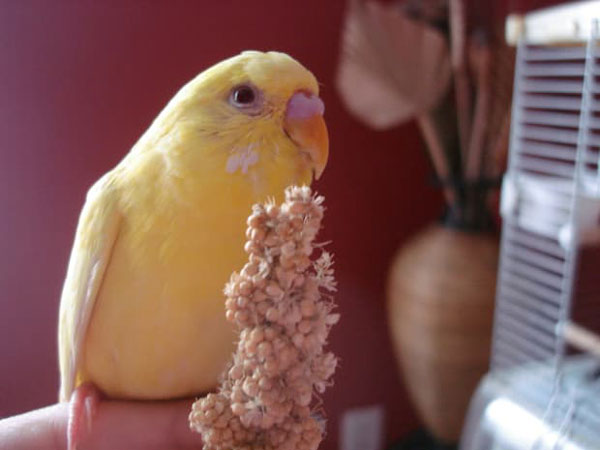
Alternatively, you can place the budgie on your chest and feed it. Initially, it may be scary for it, so you’ll need to be tender and patient. Open its beak slowly and direct the food or snack toward that direction. You can hand-feed the bird or use a bowl, depending on what you’re feeding it.
FAQ
Vision is crucial for pets, especially birds who need it for flight and other daily activities. Owners who realize vision problems often engage in research to learn ways to better their pets’ lives. The following are the frequently asked questions and their answers which you can use in research.
If the bird is partially blind, it can successfully fly around the cage without injuring itself. Also, if the bird recently lost its sight, it can still fly using the memories of the landscape. However, a budgie born blind is less likely to fly, though it can still flap its wing to maintain balance.
Despite being depressed and losing appetite, blind budgies can adjust and live normally. However, the birds will require a few adjustments around their cage to ensure their safety. Also, owners can assist the bird by interacting with them as they familiarize themselves with the landscape.
Outro
Sight is the most important sense for pet birds. Pet owners don’t always notice when birds lose sight, which veterinarians do. However, with the proper knowledge, owners can identify some symptoms and realize the condition.
Lack of flight orientation and eye discharge are some symptoms of budgie blindness. Blindness has various causes and treatments which veterinarians can direct. With the knowledge from the article, you can realize blindness in budgies and know how to handle it.
